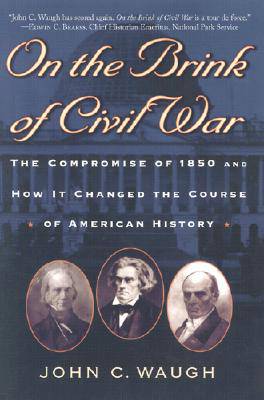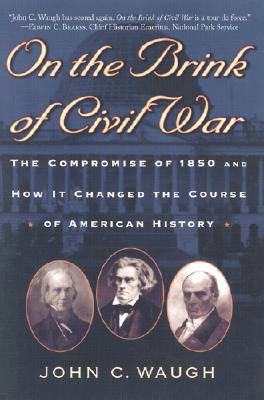
- Retrait gratuit dans votre magasin Club
- 7.000.000 titres dans notre catalogue
- Payer en toute sécurité
- Toujours un magasin près de chez vous
- Retrait gratuit dans votre magasin Club
- 7.000.0000 titres dans notre catalogue
- Payer en toute sécurité
- Toujours un magasin près de chez vous
On the Brink of Civil War
The Compromise of 1850 and How It Changed the Course of American History
John C Waugh
44,95 €
+ 89 points
Description
Years before the Civil War began, another dark conflict threatened to shatter the Union. It was December 1849. The U.S.-Mexican War had just ended, doubling the size of the country. A grave problem emerged: whether slavery should be admitted into the new territories that were to be carved out of the vast new domain resulting from the war. This dilemma strained the relationship between the slave-holding South and the antislavery North. Other issues loomed as well: where to draw the Texas boundary line with the New Mexico territory, how to settle the Texas debt claims, and what to do about the problem of fugitive slaves escaping to the North and the slavetrade in the District of Columbia. The nation was on the brink of secession, dissolution, and civil war. On the Brink of Civil War tells the dramatic story of what happened when a handful of senators-towering figures in nineteenth-century American history-tried to hammer out a compromise to save the Union. The characters in this critical political drama included Henry Clay, seasoned politician and statesman known as the 'Great Pacificator, ' who formulated an agreement in the Senate and would fight to get it through Congress; the gifted orator Daniel Webster, who helped Clay in his efforts by delivering the 'Seventh of March' compromise speech on the Senate floor, one of the most memorable speeches in American history; and John C. Calhoun, a fervent defender of slavery and the South who, though nearing death, spoke to the Senate and demanded equal rights for the South in the new Western territories. Four young senators stepped into the fray to play their own unique, important roles: Henry Seward, the Whig from New York who many say controlled President Zachary Taylor and who opposed compromise; Stephen A. Douglas, the dynamic 'Little Giant' from Illinois who favored agreement; Salmon P. Chase, the voice of the Free-Soilers and foe of compromise and concessions to the South; and Jefferson Davis, Mexican War hero and second only to Calhoun as the Voice of the South. Eventually, Douglas would take charge of the compromise on the Senate floor and engineer a political triumph. Author John C. Waugh brings all these men to life in this gripping account. Waugh's richly detailed, swiftly moving narrative reads like a novel, yet he brings perspective and interpretation to the events that will help students understand the meaning of this complex, alarming period in America's past. The Compromise of 1850 makes history come alive and will enlighten and entertain students in courses on the Civil War era, U.S. political history, and survey courses on U.S. history.
Spécifications
Parties prenantes
- Auteur(s) :
- Editeur:
Contenu
- Nombre de pages :
- 218
- Langue:
- Anglais
- Collection :
Caractéristiques
- EAN:
- 9780842029452
- Date de parution :
- 01-09-03
- Format:
- Livre broché
- Format numérique:
- Trade paperback (VS)
- Dimensions :
- 153 mm x 232 mm
- Poids :
- 371 g

Les avis
Nous publions uniquement les avis qui respectent les conditions requises. Consultez nos conditions pour les avis.






